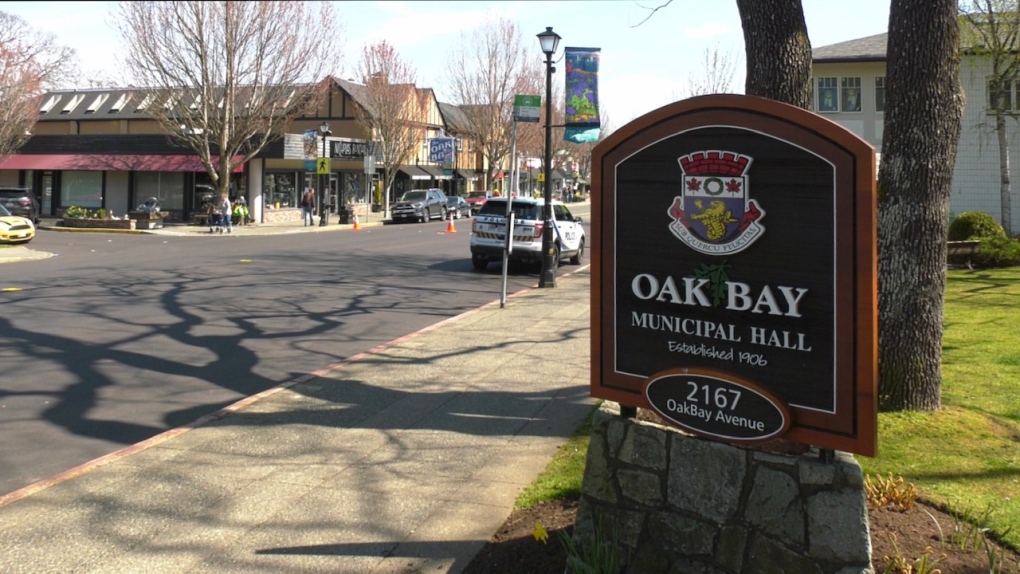Oak Bay High School offers support to students after teen's sudden death
 The District of Oak Bay on Vancouver Island is pictured: (CTV News)
The District of Oak Bay on Vancouver Island is pictured: (CTV News)
Members of the Oak Bay High School community are expressing their condolences after a teenager died unexpectedly over the weekend.
In a letter sent to families Monday, Oak Bay principal Tom Aerts said that St. Michael's University School student Harrison Helliwell died on Sunday.
The Grade 10 student went to Oak Bay High last year, and was expected to return to the school for Grade 11.
Since he previously attended Oak Bay High, the school said he likely had "many social connections" with current students.
The school provided some advice for families who may be affected by the unexpected death. The school suggests that parents listen to children and make time for them as they grieve, try to maintain a regular routine and watch for physical signs of grief, such as headaches, loss of appetite, anxiety or sleep disturbance.
Parents are also welcome to contact the school if their child would like to speak with school counsellors.
"This is a tough time of year regardless of the pandemic, the horrific tragedy in Kamloops and the death of a youth in our community," wrote Aerts.
"We hope that our sense of community and resilience will give all of us the tools to navigate this difficult time," he said.
The school also asks that parents and children "avoid social media speculation out of respect to the family and friends directly impacted."
Further advice on how to help your child through the grief process, provided by Oak Bay High, can be found below:
- Be yourself – Demonstrate your natural concern calmly and in your own words.
- Be available – Spend time with your child. Attempt to distract your child by reading, walking, going to a movie, etc.
- Listen – Let your child express his/her thoughts, concerns, feelings, and perceptions in a nonjudgmental, emotionally safe environment.
- Explain – Talk about what you know in short, ruthful statements. Don’t be afraid
- to admit that you do not have all the answers.
- Do not speculate.
- Develop resiliency – Your child will look to you for reassurance. Do not convey your own feelings of hopelessness, but rather let your child know that they will get through this difficult period.
- Provide comfort – Physical and verbal comforts are great healers.
- Attend to physical manifestations of trauma - Children will often complain of headaches, stomach aches, backaches, etc. Monitor physical symptoms such as loss of appetite, anxiety, sleep disturbance, etc. and determine whether medical intervention is required.
- Maintain regular routines – As much as possible, attempt to provide normalcy to your child. Humans are creatures of habit and derive comfort from regular routines.
- Monitor media exposure – Do not overexpose your child to media reports (especially preschool and elementary age children).
- Seek additional support – When appropriate, your child should be directed to community support agencies.
CTVNews.ca Top Stories

Justin Trudeau to step down as PM following Liberal leadership race
Prime Minister Justin Trudeau is stepping down as Liberal leader, and is proroguing Parliament as the Liberal Party of Canada embarks on the journey to replace him.
Trudeau resignation: recap key moments, analysis, reaction as it happened
Prime Minister Justin Trudeau has stepped down as Liberal leader. Here's a recap of key moments, analysis, and reaction as it happened.
Justin Trudeau steps down as Liberal leader. Who are the top contenders to replace him?
With Prime Minister Justin Trudeau's resignation as Liberal party leader, several well-known political faces may be waiting in the wings for their opportunity to take his place.
'Together, what a great nation it would be': Donald Trump, Elon Musk react to Justin Trudeau's resignation
Amid news of Prime Minister Justin Trudeau's resignation as leader of the Liberal party on Monday morning, reactions from prominent figures began piling in.
Trudeau says Parliament is 'prorogued' until March. What does that mean?
In his resignation speech on Monday, Prime Minister Justin Trudeau announced that Parliament would be prorogued until March, which will give the Liberal party time to find a new leader ahead of an expected confidence vote and early election.
Justin Trudeau is resigning, what will be his legacy? A look back at key political eras
In a seismic political move, Justin Trudeau has announced his intention to step down as leader of the Liberal Party of Canada and prime minister, once his successor is named. This decision comes after more than nine years in the country's top job and nearly 12 years at the helm of his party.
Justin Trudeau resignation: Here's what he said in Ottawa today
Prime Minister Justin Trudeau delivered a speech about his political future Monday morning outside Rideau Cottage in Ottawa. Here's the message he delivered to Canadians.
Alberta government signs new oil and gas agreement with Enbridge
The Alberta government has signed an agreement with Enbridge that Premier Danielle Smith says will increase exports of the province's heavy oil to the United States.
Trudeau leaves mixed global legacy as he exits during turbulent time, analysts say
Prime Minister Justin Trudeau will leave the world stage with a legacy of promoting feminist causes and focusing on Asia, along with criticism that Canada's actions fell short of the government's rhetoric.































